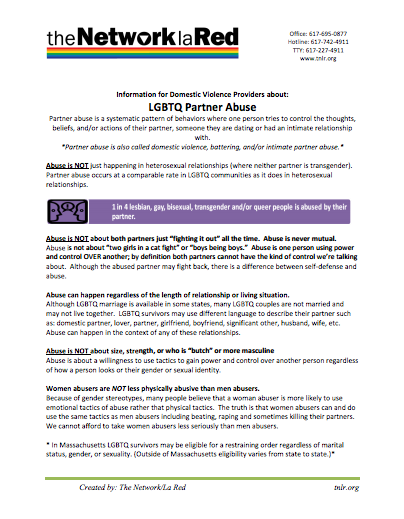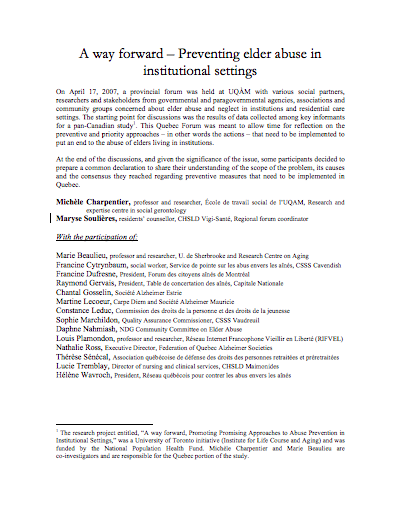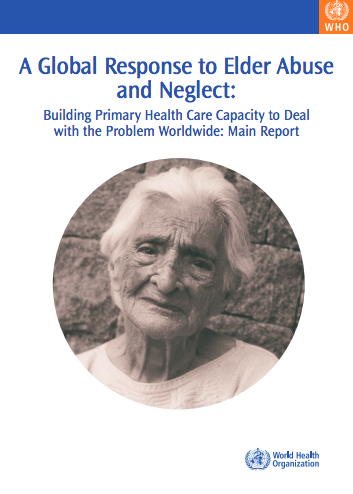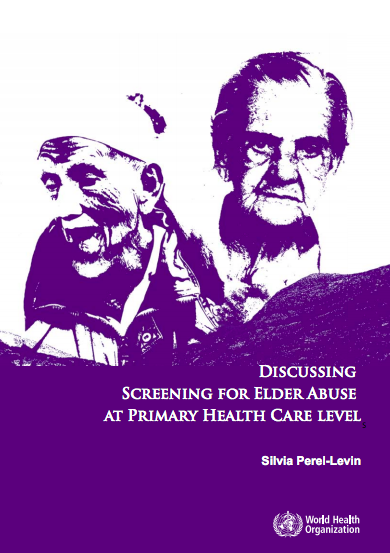 "Partner abuse is a systematic pattern of behaviors where one person tries to control the thoughts, beliefs, and/or actions of their partner, someone they are dating or had an intimate relationship with.
"Partner abuse is a systematic pattern of behaviors where one person tries to control the thoughts, beliefs, and/or actions of their partner, someone they are dating or had an intimate relationship with.
This short fact sheet on partner abuse in LGBTQ relationships covers facts and myths, tactics, how LGBTQ partner abuse differs from other types of domestic violence, and gives an explanation of the cycle of violence."
Source: The Network / La Red he Network / La Red (USA); National Resource Center on LGBT Aging (USA)
This public opinion research involved two phases – quantitative and qualitative. The quantitative research was designed to provide a foundation for developing the awareness campaign started by Human Resources and Social Development Canada in 2008. It was expected that the results of the research would provide a baseline of public awareness of the issue in Canada for tracking in the future, to inform the development of the first phase of a campaign, and to raise awareness of the issue among the general public. The purposes of this research were: (1) to gauge current levels of awareness of elder abuse among Canadians; (2) to provide baseline data for tracking the issue in the future; (3) to define appropriate language and media to convey campaign messages; and (4) to further refine target audiences.
Source: Government of Canada
 "On April 17, 2007, a provincial forum was held at UQÀM with various social partners, researchers and stakeholders from governmental and paragovernmental agencies, associations and community groups concerned about elder abuse and neglect in institutions and residential care settings. The starting point for discussions was the results of data collected among key informants for a pan-Canadian study1 . This Quebec Forum was meant to allow time for reflection on the preventive and priority approaches – in other words the actions – that need to be implemented to put an end to the abuse of elders living in institutions. At the end of the discussions, and given the significance of the issue, some participants decided to prepare a common declaration to share their understanding of the scope of the problem, its causes and the consensus they reached regarding preventive measures that need to be implemented in Quebec."
"On April 17, 2007, a provincial forum was held at UQÀM with various social partners, researchers and stakeholders from governmental and paragovernmental agencies, associations and community groups concerned about elder abuse and neglect in institutions and residential care settings. The starting point for discussions was the results of data collected among key informants for a pan-Canadian study1 . This Quebec Forum was meant to allow time for reflection on the preventive and priority approaches – in other words the actions – that need to be implemented to put an end to the abuse of elders living in institutions. At the end of the discussions, and given the significance of the issue, some participants decided to prepare a common declaration to share their understanding of the scope of the problem, its causes and the consensus they reached regarding preventive measures that need to be implemented in Quebec."
 "WHO with partners conducted a study in order to develop a strategy to prevent elder abuse within the primary health care (PHC) context. The study consisted of a qualitative research project in eight participating countries focused on testing questions originally devised by researchers in Montreal. These questions were aimed at raising awareness among PHC professionals of the issue of elder abuse."
"WHO with partners conducted a study in order to develop a strategy to prevent elder abuse within the primary health care (PHC) context. The study consisted of a qualitative research project in eight participating countries focused on testing questions originally devised by researchers in Montreal. These questions were aimed at raising awareness among PHC professionals of the issue of elder abuse."
Source: http://www.who.int/ageing/publications/elder_abuse2008/en/
 "This paper presents a critical review of the literature, discusses what is needed in order to advance knowledge by primary health care workers about elder abuse and makes recommendations about detection as a first step for the management and prevention of elder abuse."
"This paper presents a critical review of the literature, discusses what is needed in order to advance knowledge by primary health care workers about elder abuse and makes recommendations about detection as a first step for the management and prevention of elder abuse."
Source: World Health Organization
Page 18 of 20


















